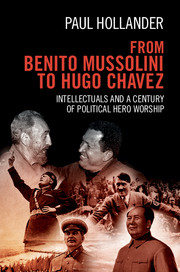Book contents
- Frontmatter
- Contents
- Preface
- 1 Introduction: Intellectuals and Politics
- 2 Mussolini, Fascism, and Intellectuals
- 3 Hitler, Nazism, and Intellectuals
- 4 Stalin, Rakosi, Soviet Communism, and Intellectuals
- 5 Western Intellectuals, Mao's China, and Cambodia under Pol Pot
- 6 Castro, Che Guevara, and Their Western Admirers
- 7 Other Dictators and Their Admirers in More Recent Times
- 8 Conclusions: The Personal and the Political
- Index
3 - Hitler, Nazism, and Intellectuals
Published online by Cambridge University Press: 19 January 2017
- Frontmatter
- Contents
- Preface
- 1 Introduction: Intellectuals and Politics
- 2 Mussolini, Fascism, and Intellectuals
- 3 Hitler, Nazism, and Intellectuals
- 4 Stalin, Rakosi, Soviet Communism, and Intellectuals
- 5 Western Intellectuals, Mao's China, and Cambodia under Pol Pot
- 6 Castro, Che Guevara, and Their Western Admirers
- 7 Other Dictators and Their Admirers in More Recent Times
- 8 Conclusions: The Personal and the Political
- Index
Summary
Above all, what Hitler offered his audience was redemption. In his speeches he talked less about policy and more about destiny. It was a privilege to live at such a decisive time in history. The Nazis were on a “splendid crusade” that would “go down as one of the most miraculous and remarkable phenomena in world history” … the forthcoming journey offered every German a chance to find meaning in their lives.
Laurence ReesThe Fuhrer alone is the present and future German reality and its law … The Fuhrer has awakened this will in the entire people and has welded it into a single resolve.
Martin HeideggerHITLER'S APPEALS IN GERMANY
While it has been well established and widely known that Hitler enjoyed broad popular support in Germany it is not well known that his supporters included large numbers of academic intellectuals and other highly educated groups. Even less is known about the sympathy, sometimes outright admiration he enjoyed among many intellectuals outside Germany. Sympathy among the latter was less widespread and less durable; nonetheless it did exist for a period of time and included some notable Western intellectuals, as will be shown below.
Although the cult of Hitler was distinguished by its intensity and spontaneity, it had several features in common with the cults of other twentieth-century dictators, notably that of Stalin. Richard Overy wrote:
They [Hitler and Stalin] were driven … by a profound commitment to a single cause, for which … they saw themselves as the historical executor … Both were driven by a remarkable determination to fulfil what they saw as a necessary place in history …
Hitler's cult of personality was not something grafted on to German political culture, but derived its appeal from a wide … expectation of a German redeemer … the two dictators approached the construction of their images in very similar ways. Both presented themselves as modest, simple men … This pose allowed both men to appear simultaneously accessible and distant … Hitler and Stalin were … presented as men burdened by high office, working ceaselessly for the nation or the revolution, all-seeing, all-knowing … the two dictatorships constructed moral orders that preached the absolute value of the collective and the absolute obligation to abandon concern for the self in the name of the whole.
- Type
- Chapter
- Information
- From Benito Mussolini to Hugo ChavezIntellectuals and a Century of Political Hero Worship, pp. 83 - 117Publisher: Cambridge University PressPrint publication year: 2017

